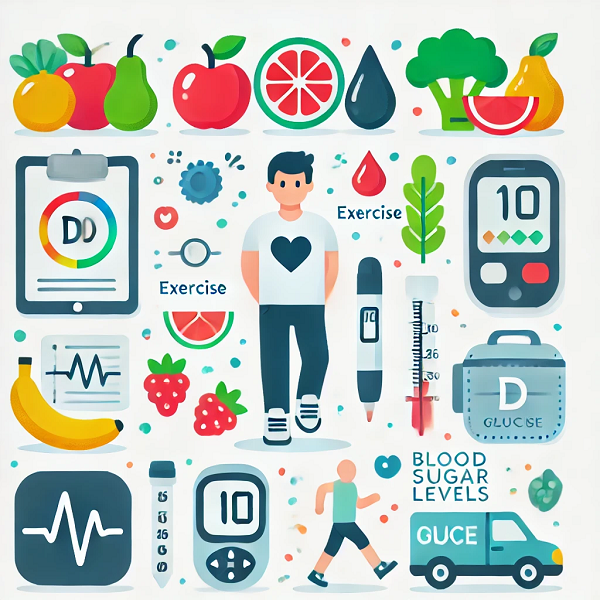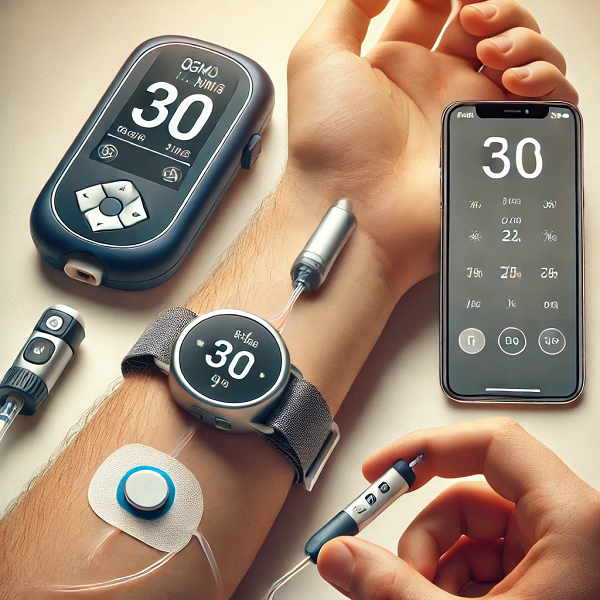Diabetes is a health condition that affects millions of people worldwide. If you or someone you know has diabetes, it’s important to understand what it is and how it can be managed. In this article, we’ll go over the basics of diabetes, what causes it, the different types, and some key tips on how to manage the condition.
What is Diabetes?
Diabetes is a condition that affects how your body uses blood sugar, also known as glucose. Glucose is important because it gives your body energy. It comes from the food you eat, and your body uses a hormone called insulin to help move glucose from your blood into your cells, where it can be used for energy.
However, if you have diabetes, your body either doesn’t make enough insulin, can’t use it properly, or doesn’t make any at all. As a result, glucose stays in your blood, causing your blood sugar levels to rise. High blood sugar can cause various health problems if it’s not managed properly.
Types of Diabetes
There are three main types of diabetes:
- Type 1 Diabetes: This type usually develops in childhood or early adulthood. It occurs when the body’s immune system attacks the cells in the pancreas that produce insulin. People with Type 1 diabetes need to take insulin every day because their bodies don’t produce it naturally.
- Type 2 Diabetes: This is the most common type of diabetes. It usually occurs in adults but is becoming more common in children and teens. Type 2 diabetes happens when the body becomes resistant to insulin or doesn’t make enough of it. This type can often be managed with diet, exercise, and medication.
- Gestational Diabetes: This type of diabetes develops during pregnancy and usually goes away after the baby is born. However, women who have gestational diabetes are more likely to develop Type 2 diabetes later in life.
What Causes Diabetes?
While the exact causes of diabetes vary depending on the type, there are some common factors that can increase the risk of developing the disease:
- Genetics: Family history plays a role in diabetes. If a parent or sibling has diabetes, your chances of developing it are higher.
- Lifestyle: Poor eating habits, being overweight, and not getting enough exercise can increase the risk of Type 2 diabetes.
- Age: The risk of Type 2 diabetes increases as you get older, especially after the age of 45.
- Pregnancy: Gestational diabetes can increase the risk of Type 2 diabetes later in life.
Symptoms of Diabetes
The symptoms of diabetes can vary, but common signs to look for include:
- Frequent urination
- Increased thirst
- Unexplained weight loss
- Extreme fatigue
- Blurred vision
- Slow healing of cuts and bruises
If you experience any of these symptoms, it’s important to see a doctor and get tested for diabetes.
Managing Diabetes
If you have diabetes, it’s important to take steps to manage your blood sugar levels and prevent complications. Here are some key strategies for managing diabetes:
1. Healthy Eating
Eating a balanced diet is one of the most important steps in managing diabetes. Your diet can have a big impact on your blood sugar levels.
- Focus on whole foods: Choose whole grains, fruits, vegetables, and lean proteins. These foods are digested more slowly and help keep your blood sugar levels steady.
- Limit sugary foods: Foods and drinks high in sugar can cause your blood sugar to spike. Try to avoid soda, candy, and desserts.
- Watch your portion sizes: Eating too much at once can cause your blood sugar to rise. Try to eat smaller, balanced meals throughout the day.
2. Exercise Regularly
Exercise is a great way to help manage diabetes. Physical activity helps your body use insulin more effectively and lowers your blood sugar levels.
- Aim for 30 minutes a day: Walking, swimming, or biking are great options. Even light physical activity can make a difference.
- Strength training: Lifting weights or doing resistance exercises helps build muscle, which can improve how your body uses insulin.
3. Monitor Your Blood Sugar
If you have diabetes, it’s important to keep track of your blood sugar levels. This helps you understand how your body reacts to different foods, activities, and medications.
- Use a blood glucose meter: Your doctor will show you how to check your blood sugar levels using a glucose meter. Make sure to track your results.
- Know your target range: Your doctor will give you a target range for your blood sugar levels. Staying within this range is important for managing your diabetes.
4. Take Medications as Prescribed
Many people with diabetes need to take medication to help manage their blood sugar levels. If your doctor has prescribed insulin or other diabetes medications, it’s important to take them as directed.
- Set reminders: Missing doses can cause your blood sugar to rise. Set reminders on your phone to help you remember.
- Talk to your doctor: If your medication isn’t working, or if you’re experiencing side effects, talk to your doctor about adjusting your treatment plan.
5. Manage Stress
Stress can have a big impact on your blood sugar levels. When you’re stressed, your body releases hormones that can make your blood sugar rise.
- Practice relaxation techniques: Deep breathing, meditation, and yoga can help reduce stress.
- Get enough sleep: Lack of sleep can increase stress and make it harder to manage your diabetes. Aim for 7-9 hours of sleep each night.
6. Stay Hydrated
Drinking enough water is important for everyone, but it’s especially important for people with diabetes. Staying hydrated helps your body get rid of excess sugar through urine.
- Drink water: Aim for at least 8 glasses of water a day. Avoid sugary drinks like soda and juice.
7. Work with Your Healthcare Team
Managing diabetes is a team effort. It’s important to work closely with your doctor, nurse, or diabetes educator to develop a treatment plan that works for you.
- Get regular checkups: Your doctor will check your A1C levels, which measure your average blood sugar over the past 2-3 months. Regular checkups also allow your doctor to check for complications.
- Ask for support: Don’t be afraid to ask your healthcare team for help if you’re struggling with managing your diabetes.
Diabetes is a serious condition, but it can be managed with the right strategies. By understanding the basics of the disease, eating a healthy diet, exercising regularly, monitoring your blood sugar, and taking medications as prescribed, you can keep your diabetes under control and live a full, healthy life. Don’t forget to stay hydrated, manage stress, and work with your healthcare team to stay on track.
References:
- American Diabetes Association: What is Diabetes?
- Mayo Clinic: Diabetes Overview
- Centers for Disease Control and Prevention (CDC): Diabetes Basics
- WebMD: Diabetes Management: How to Live Better
- National Institute of Diabetes and Digestive and Kidney Diseases (NIDDK): Managing Diabetes
#diabetesmanagement #diabetes101 #bloodsugarcontrol #healthyeating #diabetesawareness #exerciseanddiabetes #managingdiabetes #diabetesbasics #diabetescare #healthylifestyle







